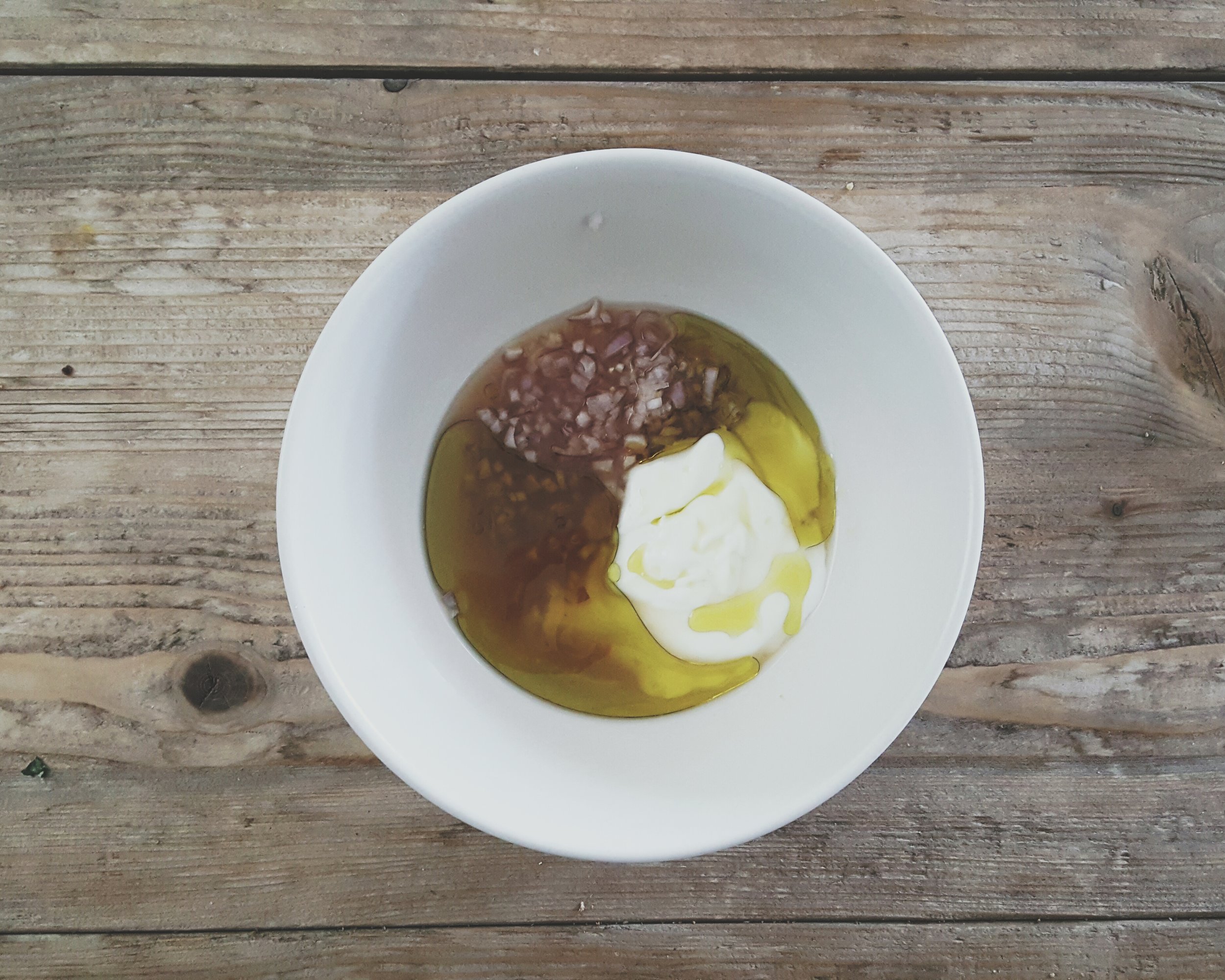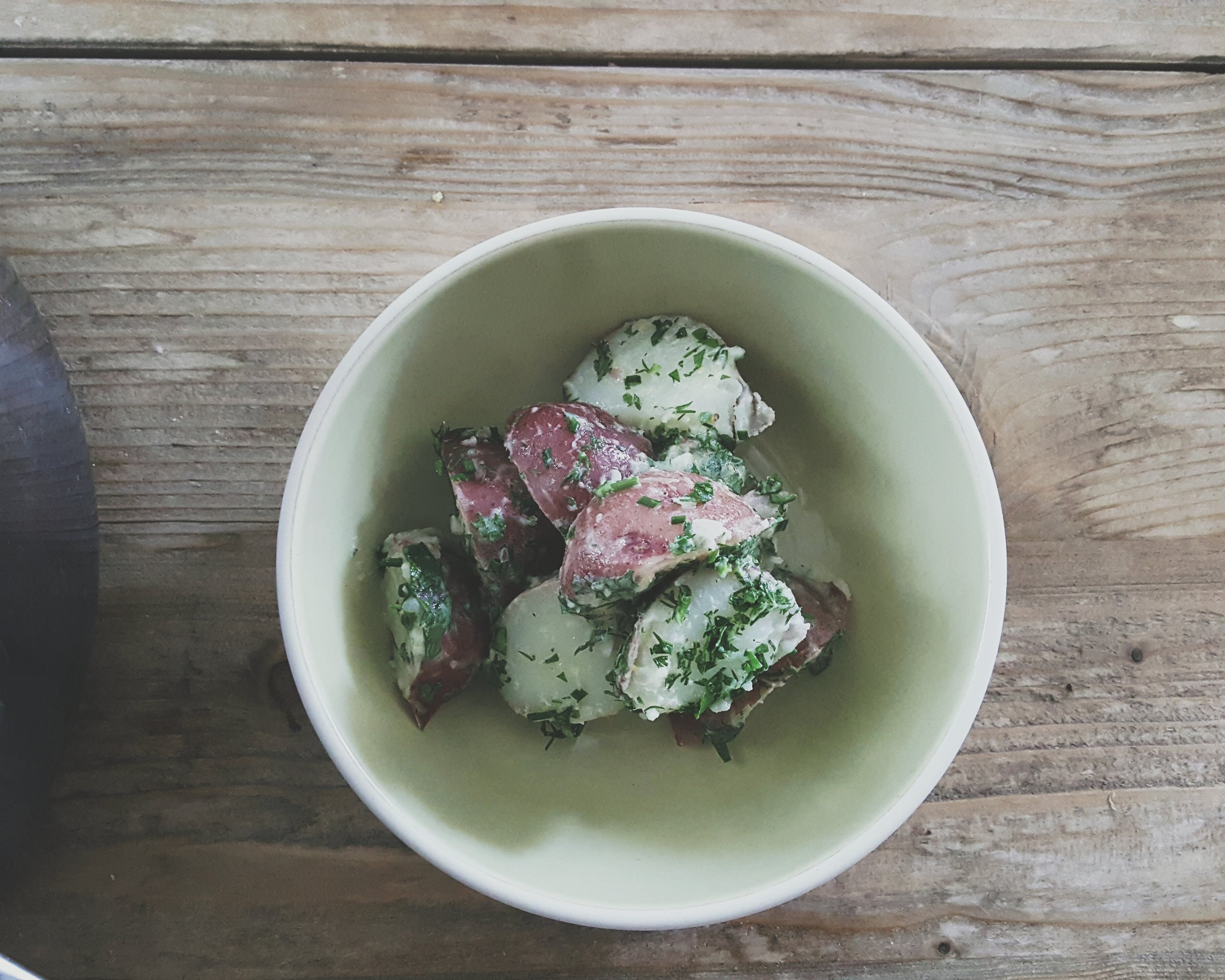For the past several months, I've had a ritual at work. After arriving to my desk and pulling my computer from its sleeve, I snatch a tin of tea from my drawer. Lately it's been a robust black tea, but since I've recently finished every last drop, I've brought a green tea called Ventura Highway, with notes of meyer lemon and fresh grass. I walk the 50 steps or so to the kitchen and pour hot water into my pot, and while the tea steeps, I read the New York Times.
I scan the morning headlines, then make my way to the food section (naturally) and the style section, and sometimes I switch to the global edition to see what's happening in far away places. It's a nice way to begin the day. But these past couple of weeks—well, ever since January—the moment before hitting return after typing in nytimes.com into my browser makes me feel a bit anxious. What happened while I was sleeping, I wonder? What today, will shake me to my core?
If you know me, you might know I'm a fairly non-confrontational person. I don't like shouting matches, and I try to listen before I speak. I know there's always more to a story. And since that day in January, I've watched friends and strangers grapple with the news. How to cope. How to move forward and do all those normal things in life we need to do when chaos feels palpable.
For doers and givers, it can be hard to know what to do. Our voices are a drop in the bucket. Our actions might be small. We might still not know what, exactly, is the best course of action, or how we even feel about everything. We might have family members who share different beliefs and political leanings.



On Inauguration Day, we drove up the coast to Santa Barbara. The trip had been planned for months, long before the election, but as we passed cars on the highway, I looked into the faces of everyone, wondering whose side they were on. Were they horrified, relieved, content, apathetic? Did they vote? Are they hurting? Are they scared? Are they wondering what everyone is so upset about? I couldn't tell, only guess, and assume I might not be the only one coming to terms with the events that morning.
While we were up in wine country the next day, racing our toddler around the vineyards and sneaking in a few bites of cheese, I watched on social media as my fellow Americans marched in cities across the country. Andrew and I caught a bit of the news that night in the cozy living room of our rented cottage, eating leftover Italian food from the night before, stunned, really. It just didn't seem real yet. It still doesn't.
So, in an effort to come together around something we can all agree on (like our basic need to eat), and share stories of immigrants and those who have come before us, we food bloggers had an idea. It started with my friend Kimberley of The Year in Food, who launched an initiative called #ImmigrantFoodStories. Food bloggers around the country are using this hashtag to tell stories on their blogs and in their social media feeds, and we hope it fills you up this week (both literally and figuratively).
In Eat This Poem fashion, I offer a poem. I ran across it years ago, actually, and sort of stored it away in the back of my mind. I guess now is the right time to share it.
Immigrant Picnic
It's the Fourth of July, the flags
are painting the town,
the plastic forks and knives
are laid out like a parade.
And I'm grilling, I've got my apron,
I've got potato salad, macaroni, relish,
I've got a hat shaped
like the state of Pennsylvania.
I ask my father what's his pleasure
and he says, "Hot dog, medium rare,"
and then, "Hamburger, sure,
what's the big difference,"
as if he's really asking.
I put on hamburgers and hot dogs,
slice up the sour pickles and Bermudas,
uncap the condiments. The paper napkins
are fluttering away like lost messages.
"You're running around," my mother says,
"like a chicken with its head loose."
"Ma," I say, "you mean cut off,
loose and cut off being as far apart
as, say, son and daughter."
She gives me a quizzical look as though
I've been caught in some impropriety.
"I love you and your sister just the same," she says,
"Sure," my grandmother pipes in,
"you're both our children, so why worry?"
That's not the point I begin telling them,
and I'm comparing words to fish now,
like the ones in the sea at Port Said,
or like birds among the date palms by the Nile,
unrepentantly elusive, wild.
"Sonia," my father says to my mother,
"what the hell is he talking about?"
"He's on a ball," my mother says.
"That's roll!" I say, throwing up my hands,
"as in hot dog, hamburger, dinner roll...."
"And what about roll out the barrels?" my mother asks,
and my father claps his hands, "Why sure," he says,
"let's have some fun," and launches
into a polka, twirling my mother
around and around like the happiest top,
and my uncle is shaking his head, saying
"You could grow nuts listening to us,"
and I'm thinking of pistachios in the Sinai
burgeoning without end,
pecans in the South, the jumbled
flavor of them suddenly in my mouth,
wordless, confusing,
crowding out everything else.
Source: Poetry (Poetry Foundation, 1999)
In the early 20th century (quite early, in fact), my great-great grandfather sailed on a ship from Sicily and settled in upstate New York. Even though by the time my generation came along my family was fully assimilated and settled in California, my grandfather still spoke in Italian and we ate meatballs at every family gathering, and he told stories about the time he went to Sicily and met with family who still lived there (who, he said, caught fish and grew grapes), and they treated him like a king.
I don't know if the vineyards are still there, but I like to think so. I went to Italy the year I graduated from college, and it felt like a homecoming of sorts. I didn't speak the language or know how to navigate the streets (we once got lost in Florence), but I just had a sense I belonged there. Part of me, anyway.
So many Americans are from somewhere else. A member of our family, likely at great personal risk but also holding onto the promise of a better life, made the life-changing decision to board a ship and make a great journey.
There is conflict in this poem. The speaker embraces his new home, corrects his family members when they misuse American phrases. It's comical and sweet, but then there is the last stanza. Perhaps a gust of wind blew by and had the slightest scent of pistachio. A memory this strong usually doesn't take much to shake us, and suddenly, through food, a small green nut "burgeoning without end" we are transported to another place that is also called home.
Warm Potato Salad with Yogurt Vinaigrette and Lots of Herbs
American potato salads have a long history of being laden with mayonnaise-based dressings, so heavy you have to pick through the bowl to find bits of potato hiding underneath. I've lightened things up with a creamy yogurt vinaigrette whose tartness comes from apple cider vinegar and mustard (softened with just a touch of honey), and a trio of herbs.
2 pounds red potatoes, scrubbed and halved or quartered, depending on size
1 tablespoon salt
1 shallot, minced
1 garlic clove, grated
2 teaspoons grainy Dijon mustard
1/4 cup apple cider vinegar
1/4 cup plain yogurt (not Greek)
1/4 cup olive oil
1/4 teaspoon salt, plus more to taste
Freshly cracked pepper
Squirt of honey (optional)
1 cup chopped mixed herbs (parsley, dill, and chives)
Place potatoes in a large stock pot and cover by at least 2 inches of water. Bring to a boil and add the salt. Cook for 12 to 15 minutes, or until potatoes are tender when pierced with a fork; drain, then pour back into the pot.
While the potatoes cook, make the vinaigrette. Add shallot and garlic to a bowl, along with mustard, apple cider vinegar, yogurt, olive oil, salt, and a few grinds of freshly cracked pepper. Whisk to combine, then taste it. If you prefer a tart dressing, it might be perfect for you. To mellow the flavor a bit, add a squirt of honey and whisk again, until it tastes just right.
Pour the vinaigrette over the potatoes and gently toss to combine. Finally, add the herbs and another pinch of salt and toss before serving.
NOTE: If you'd prefer to serve this cold, here's what I'd suggest. Add half of the dressing immediately so the potatoes soak it up, then chill. Just before serving, add the remaining half of the dressing, plus all the herbs. This will keep the herbs a vibrant green (otherwise, they'll darken a bit in the fridge.)
More Immigrant Food Stories
- Goulash with Spaetzle from The Nourished Kitchen
- Beef Teriyaki from Fix, Feast, Flair
- One Pot Citrusy Winter Root Vegetables from Foolproof Living
- Winter Squash Fritters from The Year in Food
- Nectarine and Pickled Cucumber Rice Paper Rolls from My Darling Lemon Thyme
- Lu Dan (Soy Eggs) from Honestly Yum
- Fatteh with Cumin Chickpeas & Tahini Yogurt from Kale & Caramel
- Shaba Libiya (Libyan Soup) from Farmette
- Polish Apple Pie from The Crepes of Wrath
- Armenian Bulgur Salad from Taste of Love and Nourish
- Spelt Crust Apple Pandowdy from Brooklyn Supper
- Armenian Bulgur, Parsley, and Tomato Salad from Floating Kitchen
- Lahanodolmades (Greek Cabbage Rolls) from ful-filled





